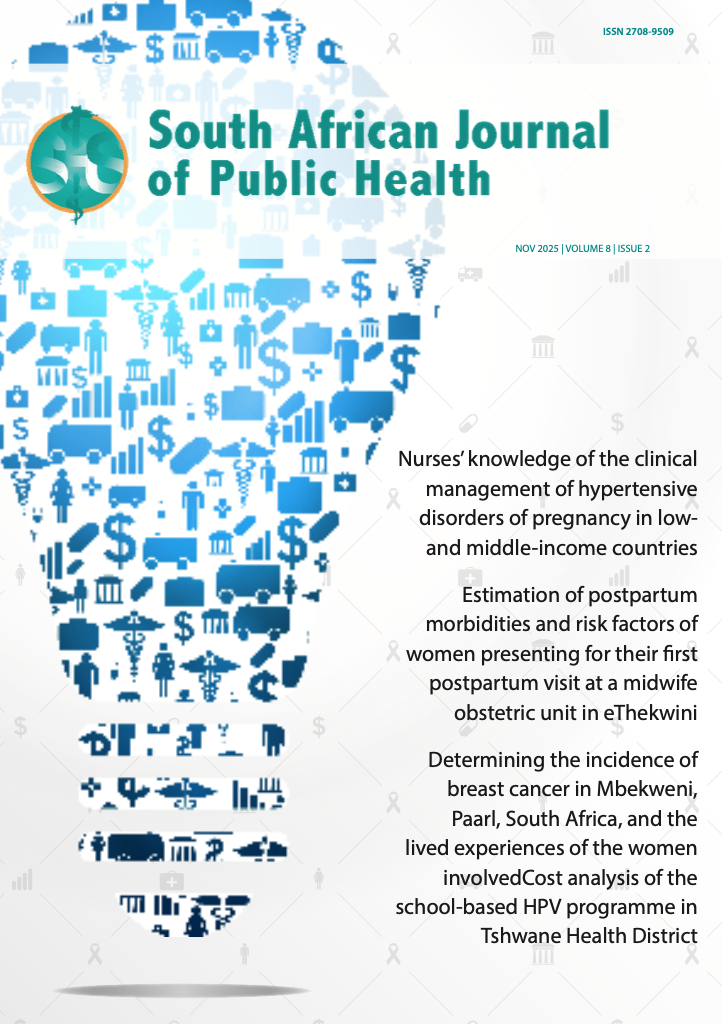Determining the incidence of breast cancer in Mbekweni, Paarl, South Africa, and the lived experiences of the women involved: A mixed-methods study
Main Article Content
Abstract
Background. Breast cancer was the most common cancer diagnosed in South African (SA) females in the year 2022, accounting for 24.1% of all cancers diagnosed. There are cultural factors that are thought to affect the early diagnosis of breast cancer in black SA women. No information on the incidence of breast cancer or its determinants specific to the study setting could be found.
Objectives. To determine the incidence of breast cancer in women aged 35 - 69 years living in the Mbekweni community in Paarl, SA, and to evaluate the lived experiences of the women involved.
Methods. This was a prospective observational study, with a convergent parallel mixed-methods design. The quantitative data were collected by means of a self-completed questionnaire, and findings on clinical breast examination, imaging reports and referrals to higher levels of care. The qualitative data were collected through small focus group discussions which were recorded, transcribed, and analysed through inductive thematic analysis.
Results. Of the sample population of 381 participants, a total of 55 (14.4%) were found to have suspicious clinical findings and required an imaging study. Upon receipt of the imaging reports, 4 (1.0%) required referral for biopsies or further management. At the time of writing, only 1 participant (0.3%) had been confirmed as having cancer, which was used to calculate an incidence of breast cancer of 6 cases per 1 000 person-years. Although only a single case was identified during the study period, there was some awareness of and insight into breast cancer in this community. There was also a perceived increase in the prevalence of breast cancer. However, it is a disease still stigmatised by a plethora of myths and cultural beliefs, which negatively influences women’s choice to seek help early.
Conclusion. The incidence of breast cancer in women aged 35 - 69 years in Mbekweni was low in absolute terms, with only one confirmed case during the study period. Despite this, some insight and awareness surrounding breast cancer in the community was evident. There is a significant desire for more information in this community, which can provide healthcare workers with a valuable opportunity to educate and empower the members and positively influence the overall health of the community.
Article Details
Issue
Section

This work is licensed under a Creative Commons Attribution-NonCommercial 4.0 International License.
The SAJPH is published under an Attribution-Non Commercial International Creative Commons Attribution (CC-BY-NC 4.0) License. Under this license, authors agree to make articles available to users, without permission or fees, for any lawful, non-commercial purpose. Users may read, copy, or re-use published content as long as the author and original place of publication are properly cited.
How to Cite
References
1. National Institute of Communicable Diseases, South Africa. National Cancer Registry 2022, updated 2024. https://www.nicd.ac.za/wp-content/uploads/2024/04/NCR_ASR_ tables_2022_final.pdf (accessed 19 August 2024).
2. Vorobiof DA, Sitas F, Vorobiof G. Breast cancer incidence in South Africa. J Clin Oncol 2001;19(18 Suppl):125S-127S.
3. Department: Statistics South Africa. National Poverty Lines 2023. Statistical Release P0310.1. Pretoria: Stats SA, updated 28 August 2023. https://www.statssa.gov.za/ publications/P03101/P031012023.pdf (accessed 3 September 2024).
4. Tenny S, Boktor SW. Incidence. In: StatPearls. Treasure Island, Fla.: StatPearls Publishing, updated 10 April 2023. https://www.ncbi.nlm.nih.gov/books/NBK430746 (accessed 19 August 2024).
